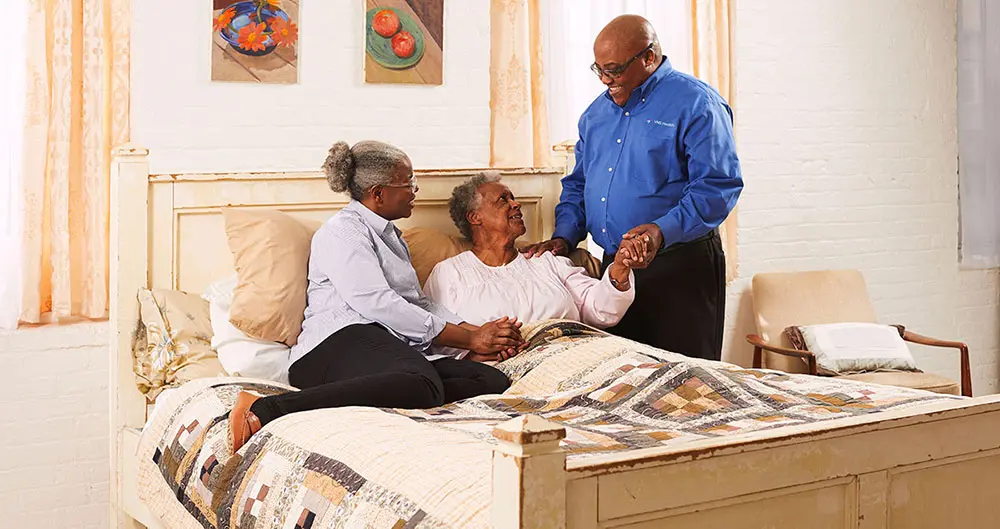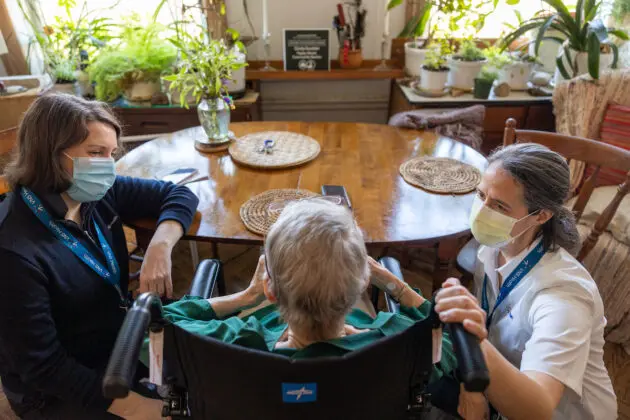
When it’s time for your loved one to begin hospice care, it’s also time for some serious — and sometimes scary — conversations with the rest of your family.
As the primary or local caregiver, you’ve likely seen that treatments have become less successful. You’ve been to the appointments. You’ve watched the day-to-day changes in your loved one. But family members who don’t live nearby or aren’t able to see your loved one as often as you do, may not be up to speed.
Thinking about hospice care can be scary. It’s normal to find excuses to avoid talking about it. However, open and respectful conversations can make the transition to hospice care easier for everyone.
If you aren’t sure where to start, ask your loved one what they want, or ask their spouse or partner. One or both should set the tone of these discussions and decide who should be involved and what information should be shared. They should also have the final say on decisions.
Then use the following talking points to help you begin or continue discussions with family members about hospice care for your loved one.
1. Explain — and be honest about — the status of your loved one’s condition.
Talk to your family about the realities of your loved one’s physical and emotional health. In addition to their medical condition, discuss how comfortable they are and what kind of pain they’re in. Do they tire easily? Have the side effects of treatments increased while the treatments themselves have become less effective? Let your family members know that your loved one’s care needs have increased and you’re looking for solutions — and that hospice care is one option.
2. Talk about the signs that can indicate that a person is ready for hospice care.
Even with all the information about your loved one’s health, family members might remain hesitant. This can be because the thought of hospice care can come with fear, confusion, or both.
For instance, some people think that hospice care is only for the last few days or weeks of life. In fact, your loved one can receive hospice care for 6 months, and sometimes even longer. In general, they are eligible for hospice care if their health care provider believes they would live for around 6 months without treatment for their illness.
Bring specific examples to the conversation. For instance, are you having trouble managing your loved one’s pain? Are treatments not working as well or causing pain? These are some reasons to start hospice care.
Hospice care supports individuals at the end of life, as well as their families, by providing medical, emotional, and spiritual care. The goal is to help make the last months as comfortable and meaningful as possible.
3. Focus on the benefits of hospice care.
Your family may not know what hospice care is or how helpful it can be.
Hospice care is designed for people near the end of life, and for their families. Care is provided by specially trained hospice teams, who can answer your questions and listen to your fears about loss and your memories of happy times. Your team works with you and your loved one to make sure you get the care and support you want.
Talking about the services available to your loved one can comfort you and your family. Explain that hospice care includes:
- Medical care for your loved one’s terminal illness (or one that is not curable or reversible), including medications and equipment
- Practical help, such as meal preparation
- Personal care, such as help with eating and bathing
- Emotional and spiritual support
Hospice care also supports you and the rest of your family, including by providing resources and information and by assisting with relationship building during this transition.
4. Leave space for questions.
Good conversations involve back-and-forth communication. Leave space for anyone involved to ask their own questions about your loved one’s care.
Remember that this might not be a one-time talk. Remind your family members that if they have questions in the future, you can help answer them or direct them to the right person or resource.
Hospice Care Supports Your Loved One and Your Family
The transition to hospice care can be a major change for everyone. As you take steps to make sure your loved one gets the best care possible, keep your family involved. Open and honest communication will help ensure that everyone feels heard, understood, and cared for.


